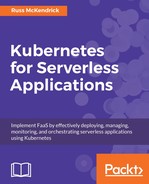One of the things you may have been thinking to yourself when reading the previous chapter is that Kubernetes seems complex. There are a lot of moving parts, which not only need to be configured but also monitored and managed.
I remember when I originally looked at Kubernetes when it was first released before the stable version, and the installation instructions were very long and also things were a little delicate.
Misread a step at the beginning of the installation process and you could find yourself in a lot of trouble later in the installation—it reminded me of when magazines used to contain type in listings for games. If you made a typo anywhere then things would either flat-out not work or crash unexpectedly.
As Kubernetes matured, so did the installation process. Quite quickly a number of helper scripts were developed to aid in launching Kubernetes across various platforms; Minikube is one of these tools.
It has one job, to create a local Kubernetes node. Considering the breadth of features supported by Kubernetes, it has a surprising number of features, such as:
- DNS, NodePorts, and Ingress
- ConfigMaps and Secrets
- A choice of container runtimes; you can use either Docker or rkt
- Persistent Volumes via hostPath
- Dashboards
Kubernetes features that would typically require a public cloud provider, such as AWS, Microsoft Azure, or Google Cloud, or multiple hosts, are not supported. Some of these features are:
- LoadBalancers
- Advanced scheduling policies
This is because Minikube only launches a single node on a virtual machine on your local PC. This shouldn't limit you though; remember that you would only ever want to use Minikube for development and you should never build production services using it. There are a lot more tools, which will be covered in Chapter 6, Installing Kubernetes in the Cloud, more suited to launching production-ready Kubernetes clusters in public clouds or other vendors.
Minikube is made up of two core components:
- libmachine: This library from Docker is used to provision virtual machines on your host machine. It is a core component of Docker Machine as well as Docker for macOS and Docker for Windows.
- localkube: This library, developed and donated to the Minikube project by Redspread (which is now a part of CoreOS), is responsible for deploying and maintaining the Kubernetes node once the virtual machine has been launched.
Rather than talking about what Minikube can do any more, we should look at installing it and then discuss how we can interact with it.
